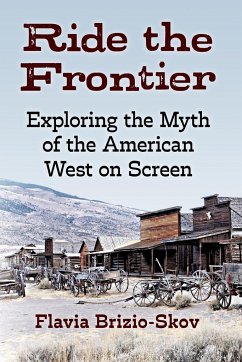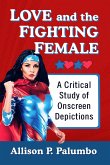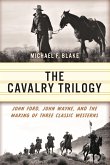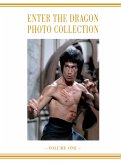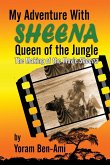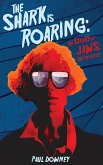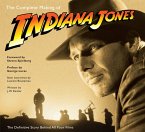- Broschiertes Buch
- Merkliste
- Auf die Merkliste
- Bewerten Bewerten
- Teilen
- Produkt teilen
- Produkterinnerung
- Produkterinnerung
With fresh appraisals of popular Westerns, this book examines the history of the genre with a focus on definitional aspects of canon, adaptation and hybridity. The author covers a range of largely unexplored topics, including the role of ""heroines"" in a male-oriented system of film production, and the function of the celluloid Indians.
Andere Kunden interessierten sich auch für
![Love and the Fighting Female Love and the Fighting Female]() Allison P. PalumboLove and the Fighting Female47,99 €
Allison P. PalumboLove and the Fighting Female47,99 €![The Cavalry Trilogy The Cavalry Trilogy]() Michael F. BlakeThe Cavalry Trilogy26,99 €
Michael F. BlakeThe Cavalry Trilogy26,99 €![Enter the Dragon Bruce Lee Vol 1 Enter the Dragon Bruce Lee Vol 1]() Ricky BakerEnter the Dragon Bruce Lee Vol 143,99 €
Ricky BakerEnter the Dragon Bruce Lee Vol 143,99 €![My Adventure With Sheena, Queen of the Jungle My Adventure With Sheena, Queen of the Jungle]() Yoram Ben-AmiMy Adventure With Sheena, Queen of the Jungle25,99 €
Yoram Ben-AmiMy Adventure With Sheena, Queen of the Jungle25,99 €![The Shark is Roaring (hardback) - The Story of Jaws The Shark is Roaring (hardback) - The Story of Jaws]() Paul DowneyThe Shark is Roaring (hardback) - The Story of Jaws36,99 €
Paul DowneyThe Shark is Roaring (hardback) - The Story of Jaws36,99 €![Professionals in Western Film and Fiction Professionals in Western Film and Fiction]() Kenneth E. HallProfessionals in Western Film and Fiction50,99 €
Kenneth E. HallProfessionals in Western Film and Fiction50,99 €![The Complete Making of Indiana Jones The Complete Making of Indiana Jones]() J.W. RinzlerThe Complete Making of Indiana Jones34,99 €
J.W. RinzlerThe Complete Making of Indiana Jones34,99 €-
-
-
With fresh appraisals of popular Westerns, this book examines the history of the genre with a focus on definitional aspects of canon, adaptation and hybridity. The author covers a range of largely unexplored topics, including the role of ""heroines"" in a male-oriented system of film production, and the function of the celluloid Indians.
Hinweis: Dieser Artikel kann nur an eine deutsche Lieferadresse ausgeliefert werden.
Hinweis: Dieser Artikel kann nur an eine deutsche Lieferadresse ausgeliefert werden.
Produktdetails
- Produktdetails
- Verlag: McFarland & Co Inc
- Seitenzahl: 254
- Erscheinungstermin: 3. Februar 2021
- Englisch
- Abmessung: 229mm x 152mm x 15mm
- Gewicht: 346g
- ISBN-13: 9781476683065
- ISBN-10: 1476683069
- Artikelnr.: 61322126
- Herstellerkennzeichnung
- Libri GmbH
- Europaallee 1
- 36244 Bad Hersfeld
- gpsr@libri.de
- Verlag: McFarland & Co Inc
- Seitenzahl: 254
- Erscheinungstermin: 3. Februar 2021
- Englisch
- Abmessung: 229mm x 152mm x 15mm
- Gewicht: 346g
- ISBN-13: 9781476683065
- ISBN-10: 1476683069
- Artikelnr.: 61322126
- Herstellerkennzeichnung
- Libri GmbH
- Europaallee 1
- 36244 Bad Hersfeld
- gpsr@libri.de
Flavia Brizio-Skov is a professor in the department of modern foreign languages and literatures at the University of Tennessee, Knoxville. She has written several books and articles on contemporary writers, popular culture and cinema.
Table of Contents Acknowledgments Introduction: Why the Western? 1.
Transnational Adaptation, Transculturation and Indigenization: Dashiell Hammett's Red Harvest, Carlo Goldoni's The Servant of Two Masters, Akira Kurosawa's Yojimbo and Sergio Leone's A Fistful of Dollars Prologue The National The Origins: Local and Translocal The Transnational Conclusion 2.
Celluloid Indians, 1950s Westerns and the Termination Act: Broken Arrow, White Feather, The Battle of Apache Pass, Devil's Doorway, The Last Wagon and The Last Hunt Prologue Broken Arrow (1950) White Feather (1955) and The Battle of Apache Pass (1952) Devil's Doorway (1950) The Last Wagon (1956) The Last Hunt (1956) Conclusion 3.
Heroines in Western Films? Mikhail Bakhtin's "Dialogic Imagination" in Shane, High Noon and Westward the Women Monoglossia: The Submissive Woman and Shane (1953) Heteroglossia: The Transgressive Woman and High Noon (1952) X-glossia: Transformational Women and Westward the Women (1951) 4.
Hybridity and (De)Construction of Femininity and Masculinity in Rancho Notorious, Johnny Guitar and Duel in the Sun Rancho Notorious: The Filmic Text (1952) Johnny Guitar: Paratext Johnny Guitar: Peritext and the Novel (1953) Johnny Guitar: The Filmic Text (1954) Duel in the Sun (1946): Paratext Duel in the Sun: The Novel (1944) Duel in the Sun: The Filmic Text (1946) Patriarchy and Failed Masculinities Patriarchy and Failed Femininities Capitalism and Patriotism 5.
New Paths of the Western in the Third Millennium: The Lone Ranger, Yesterday and Today The Western Genre Today Enter The Lone Ranger: Prologue The Lone Ranger Yesterday or How the West Was Conquered The Lone Ranger (2013): Paratext The Lone Ranger Today or How the West Was Lost Chapter Notes Bibliography Index
Transnational Adaptation, Transculturation and Indigenization: Dashiell Hammett's Red Harvest, Carlo Goldoni's The Servant of Two Masters, Akira Kurosawa's Yojimbo and Sergio Leone's A Fistful of Dollars Prologue The National The Origins: Local and Translocal The Transnational Conclusion 2.
Celluloid Indians, 1950s Westerns and the Termination Act: Broken Arrow, White Feather, The Battle of Apache Pass, Devil's Doorway, The Last Wagon and The Last Hunt Prologue Broken Arrow (1950) White Feather (1955) and The Battle of Apache Pass (1952) Devil's Doorway (1950) The Last Wagon (1956) The Last Hunt (1956) Conclusion 3.
Heroines in Western Films? Mikhail Bakhtin's "Dialogic Imagination" in Shane, High Noon and Westward the Women Monoglossia: The Submissive Woman and Shane (1953) Heteroglossia: The Transgressive Woman and High Noon (1952) X-glossia: Transformational Women and Westward the Women (1951) 4.
Hybridity and (De)Construction of Femininity and Masculinity in Rancho Notorious, Johnny Guitar and Duel in the Sun Rancho Notorious: The Filmic Text (1952) Johnny Guitar: Paratext Johnny Guitar: Peritext and the Novel (1953) Johnny Guitar: The Filmic Text (1954) Duel in the Sun (1946): Paratext Duel in the Sun: The Novel (1944) Duel in the Sun: The Filmic Text (1946) Patriarchy and Failed Masculinities Patriarchy and Failed Femininities Capitalism and Patriotism 5.
New Paths of the Western in the Third Millennium: The Lone Ranger, Yesterday and Today The Western Genre Today Enter The Lone Ranger: Prologue The Lone Ranger Yesterday or How the West Was Conquered The Lone Ranger (2013): Paratext The Lone Ranger Today or How the West Was Lost Chapter Notes Bibliography Index
Table of Contents Acknowledgments Introduction: Why the Western? 1.
Transnational Adaptation, Transculturation and Indigenization: Dashiell Hammett's Red Harvest, Carlo Goldoni's The Servant of Two Masters, Akira Kurosawa's Yojimbo and Sergio Leone's A Fistful of Dollars Prologue The National The Origins: Local and Translocal The Transnational Conclusion 2.
Celluloid Indians, 1950s Westerns and the Termination Act: Broken Arrow, White Feather, The Battle of Apache Pass, Devil's Doorway, The Last Wagon and The Last Hunt Prologue Broken Arrow (1950) White Feather (1955) and The Battle of Apache Pass (1952) Devil's Doorway (1950) The Last Wagon (1956) The Last Hunt (1956) Conclusion 3.
Heroines in Western Films? Mikhail Bakhtin's "Dialogic Imagination" in Shane, High Noon and Westward the Women Monoglossia: The Submissive Woman and Shane (1953) Heteroglossia: The Transgressive Woman and High Noon (1952) X-glossia: Transformational Women and Westward the Women (1951) 4.
Hybridity and (De)Construction of Femininity and Masculinity in Rancho Notorious, Johnny Guitar and Duel in the Sun Rancho Notorious: The Filmic Text (1952) Johnny Guitar: Paratext Johnny Guitar: Peritext and the Novel (1953) Johnny Guitar: The Filmic Text (1954) Duel in the Sun (1946): Paratext Duel in the Sun: The Novel (1944) Duel in the Sun: The Filmic Text (1946) Patriarchy and Failed Masculinities Patriarchy and Failed Femininities Capitalism and Patriotism 5.
New Paths of the Western in the Third Millennium: The Lone Ranger, Yesterday and Today The Western Genre Today Enter The Lone Ranger: Prologue The Lone Ranger Yesterday or How the West Was Conquered The Lone Ranger (2013): Paratext The Lone Ranger Today or How the West Was Lost Chapter Notes Bibliography Index
Transnational Adaptation, Transculturation and Indigenization: Dashiell Hammett's Red Harvest, Carlo Goldoni's The Servant of Two Masters, Akira Kurosawa's Yojimbo and Sergio Leone's A Fistful of Dollars Prologue The National The Origins: Local and Translocal The Transnational Conclusion 2.
Celluloid Indians, 1950s Westerns and the Termination Act: Broken Arrow, White Feather, The Battle of Apache Pass, Devil's Doorway, The Last Wagon and The Last Hunt Prologue Broken Arrow (1950) White Feather (1955) and The Battle of Apache Pass (1952) Devil's Doorway (1950) The Last Wagon (1956) The Last Hunt (1956) Conclusion 3.
Heroines in Western Films? Mikhail Bakhtin's "Dialogic Imagination" in Shane, High Noon and Westward the Women Monoglossia: The Submissive Woman and Shane (1953) Heteroglossia: The Transgressive Woman and High Noon (1952) X-glossia: Transformational Women and Westward the Women (1951) 4.
Hybridity and (De)Construction of Femininity and Masculinity in Rancho Notorious, Johnny Guitar and Duel in the Sun Rancho Notorious: The Filmic Text (1952) Johnny Guitar: Paratext Johnny Guitar: Peritext and the Novel (1953) Johnny Guitar: The Filmic Text (1954) Duel in the Sun (1946): Paratext Duel in the Sun: The Novel (1944) Duel in the Sun: The Filmic Text (1946) Patriarchy and Failed Masculinities Patriarchy and Failed Femininities Capitalism and Patriotism 5.
New Paths of the Western in the Third Millennium: The Lone Ranger, Yesterday and Today The Western Genre Today Enter The Lone Ranger: Prologue The Lone Ranger Yesterday or How the West Was Conquered The Lone Ranger (2013): Paratext The Lone Ranger Today or How the West Was Lost Chapter Notes Bibliography Index

